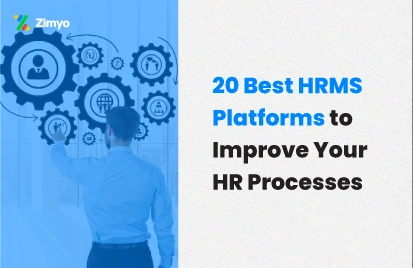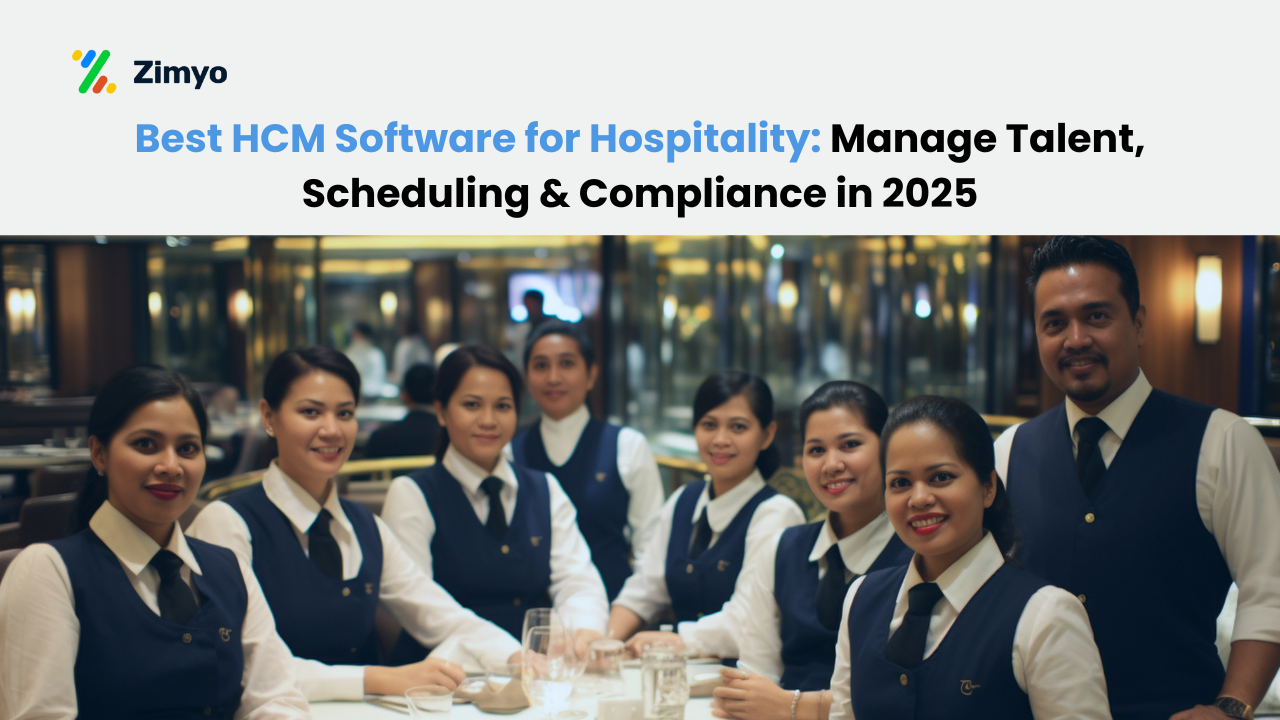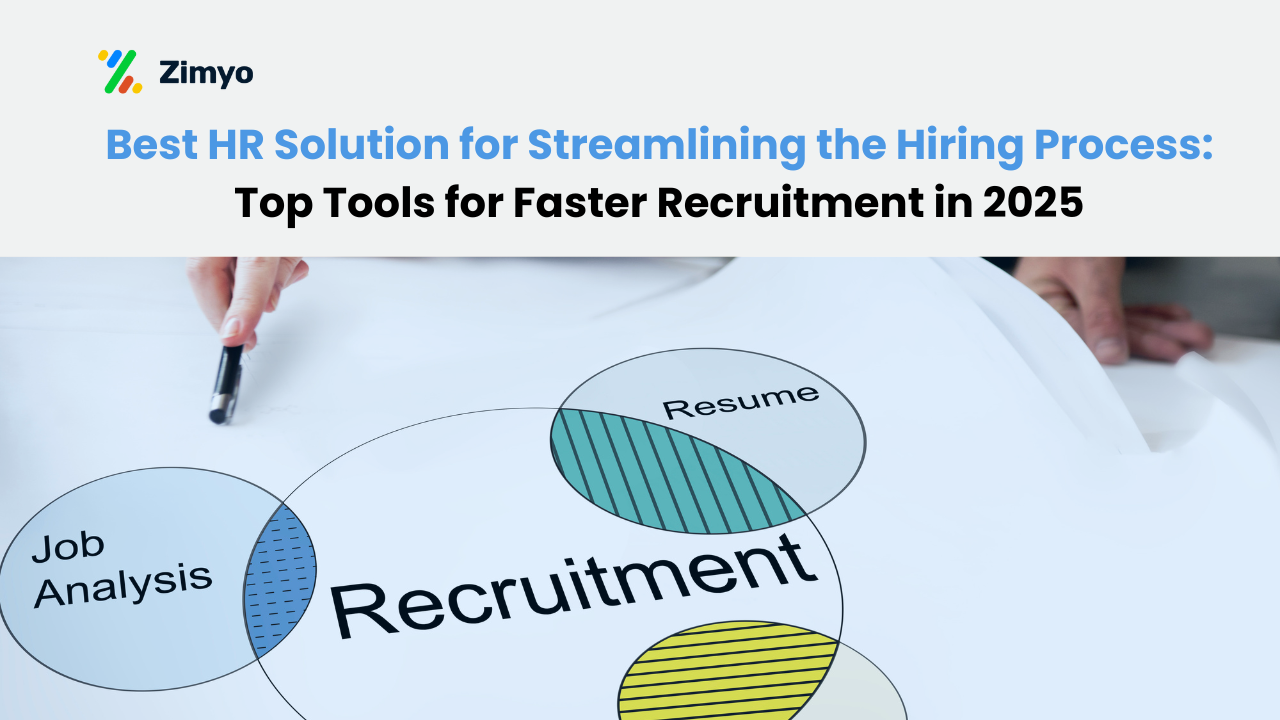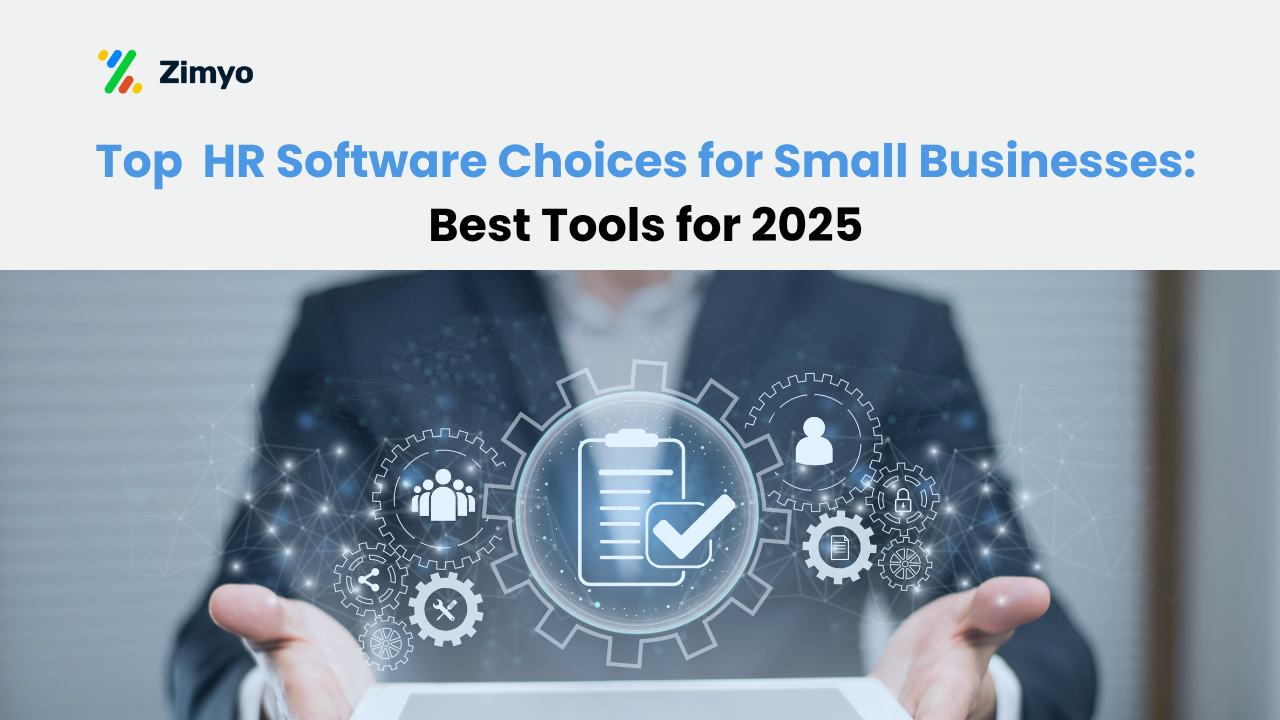In the rapid business world of today, where companies are growing quickly and workers’ expectations are changing, it is no longer practical to manually manage human resources. Paper-based records, spreadsheets, and dissected systems might have been fine for a group of 10 but what happens when your company expands to 100 or 1,000 workers?
That’s where HRMS software, also known as Human Resource Management System, enters the scene.
It’s not merely another technology gadget; it’s the online backbone of contemporary HR functions. From compensation to attendance, from hiring to performance management an HRMS does it all automatically.
As India emerges as a global hub for startups and enterprises alike, the demand for the best HRMS software in India has grown exponentially. Companies today want scalable, cloud-based systems that simplify compliance, empower employees, and deliver actionable insights.
In this comprehensive guide, we’ll explore:
- What HRMS is and why it matters,
- The top 11 HRMS software in India,
- Key features to look for, and
- How to select the right HRMS for your business.
Let’s get started.
What is HRMS?
A Human Resource Management System (HRMS) is a platform that connects multiple processes and is planned to organize and automate HR processes throughout the employee life cycle.
Imagine HRMS as the central nervous system of your HR department because it ties all HR functions together, holds essential employee information, and automates time-consuming administrative tasks that used to consume hours of manual labor.
Major Functions of an HRMS:
1. Recruitment and Onboarding:
Streamline job postings, candidate databases, and onboarding workflows.
2. Payroll Processing:
Automate salary calculations, deductions, reimbursements, and statutory compliance (PF, ESI, TDS, etc.).
3. Attendance and Leave Management:
Monitor attendance using biometric or GPS and sanction leave requests in real-time.
4. Performance Management:
Develop open appraisal systems using OKRs, KRAs, and 360° feedback.
5. Employee Engagement:
Enhance morale using surveys, reward, and recognition modules.
6. Analytics and Reporting:
Provide real-time reports on attrition, payroll expenses, and workforce productivity.
Top 11 HRMS Software in India
India has witnessed a growth in adoption of HR technology, and local as well as international players compete to provide unique solutions. Here’s an in-depth look at the top HRMS software in India:
1. Zimyo
Zimyo has grown to become one of the top-rated HRMS software in India within a short period, providing an integrated HR suite for both enterprises and startups. Believed in by 2,500+ organizations around the globe, Zimyo makes everything from hiring to retirement easy.
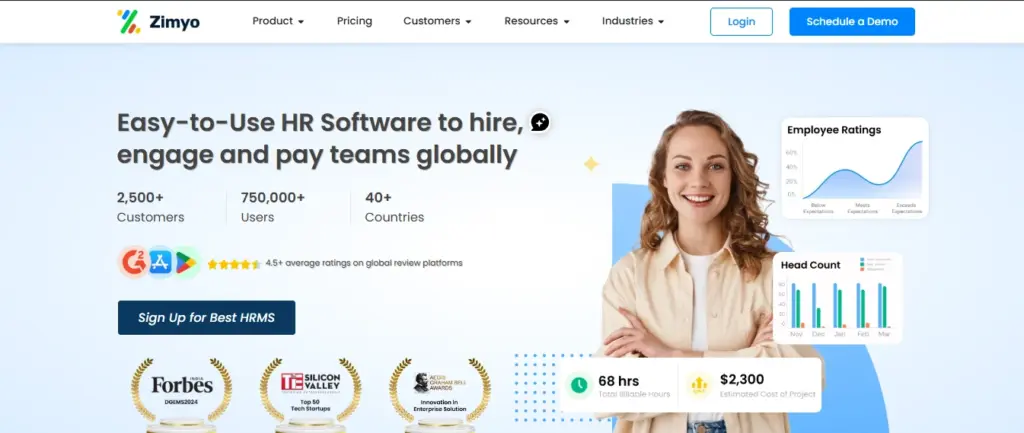
Key Features:
- Automated Payroll & Compliance: Handles complex payroll calculations, tax deductions, and statutory filings effortlessly.
- Attendance & Leave Management: GPS and biometric integrations ensure accurate tracking.
- Performance Management System: Set OKRs, track goals, and conduct 360° reviews for transparent growth.
- Employee Self-Service Portal: Enables employees to access payslips, apply for leaves, and view updates anytime.
- Mobile Accessibility: HRMS on the go with a user-friendly mobile app.
Pros:
- Highly intuitive and user-friendly
- Customizable workflows and dashboards
- Excellent customer support
- Mobile app for employees and HR teams
Cons:
- Custom reports may require setup assistance
2. factoHR
factoHR is a mobile-first HCM platform widely used to simplify HR processes in India. It is designed to automate the entire employee lifecycle from hire to retire with a particular emphasis on complex statutory compliance and retirement benefit management that few other HRMS software providers offer.
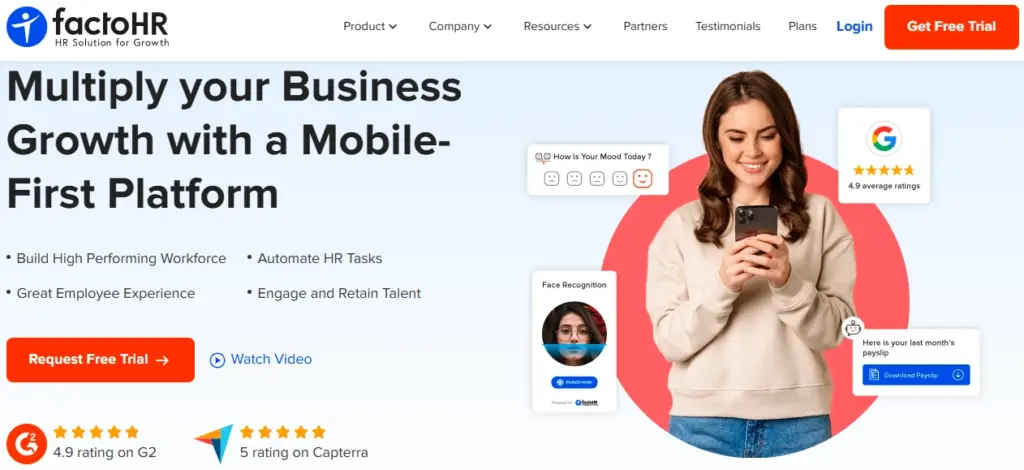
Key Features:
- Attendance, leave, and payroll automation with statutory compliance
- Mobile-based attendance with GPS, geofencing, and selfie punch
- Performance management with OKRs and continuous feedback
- Employee self-service for documents, leave, and claims
Pros:
- Strong India-specific payroll and compliance coverage
- Mobile-first experience with an intuitive app
- Integrated payroll, attendance, and performance modules
Cons:
- Initial setup may take time due to compliance configuration
- Advanced analytics available in higher plans
3. Zoho People
Zoho People is another strong competitor in the HRMS space. Developed for small and medium-sized businesses, Zoho provides flexibility, simplicity, and seamless integration with other Zoho tools.
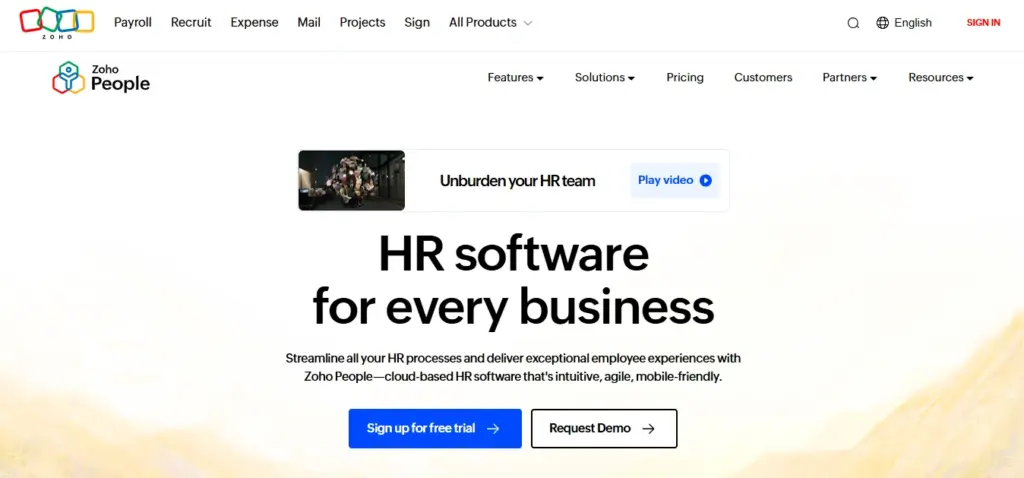
Key Features:
- Attendance, leave, and time tracking modules.
- Workflow automation for approvals and employee data.
- Performance reviews with custom evaluation forms.
- Seamless integration with Zoho Books, CRM, and Mail.
Pros:
- Affordable and scalable for small businesses
- Easy integration with other Zoho tools
- Intuitive interface and mobile access
Cons:
- Limited customization outside the Zoho suite
- Advanced reporting may require higher-tier plans
4. Darwinbox
Darwinbox is a modern-day HRMS designed for enterprises and high-growth firms. It offers AI-based applications to automate onboarding, payroll, and talent management.
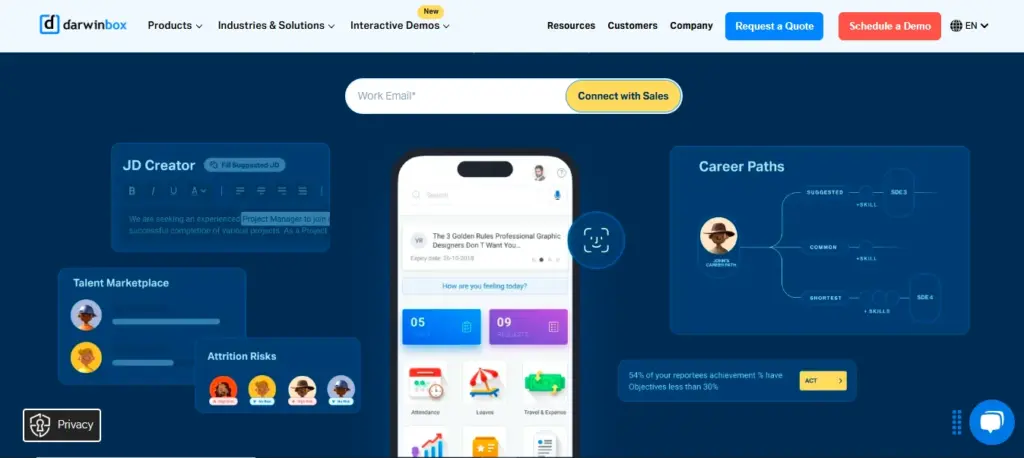
Key Features:
- Predictive analytics and HR dashboards.
- Mobile-first design for remote accessibility.
- Integrated recruitment, performance, and engagement tools.
- Cloud-based scalability with enterprise-grade security.
Pros:
- Strong focus on automation and analytics
- Excellent for large-scale organizations
- Modern, intuitive UI
Cons:
- Expensive for small businesses
- Steep learning curve for first-time users
5. HRMantra
HRMantra is an emerging HR management software solution in India, automating different HR processes.
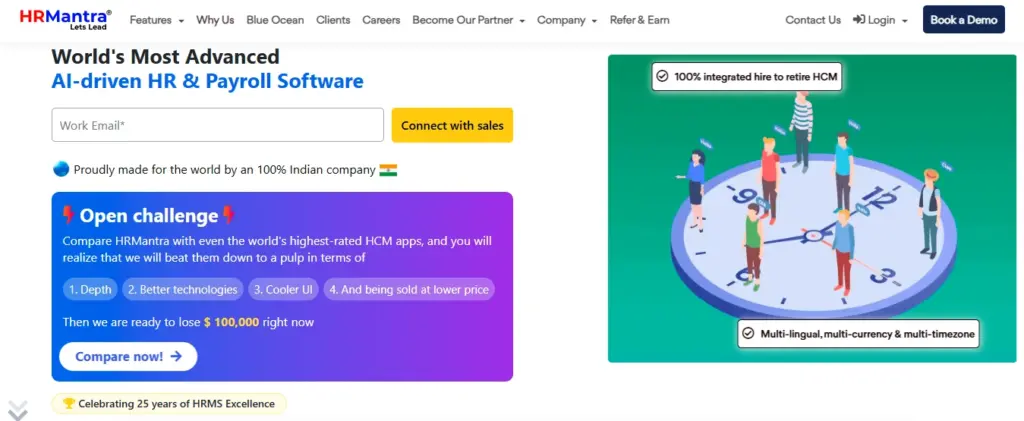
Core Features:
- Recruitment and training management.
- Real-time reporting dashboards.
- Expense, payroll, and attendance automation.
- Custom workflows and access control.
Pros:
- Highly customizable for enterprise needs
- Strong payroll and compliance support
Cons:
- Dated user interface
- Can feel complex for smaller teams
6. ADP
A worldwide payroll and HR service leader, ADP provides enterprise-class HRMS solutions used by corporations across the globe.
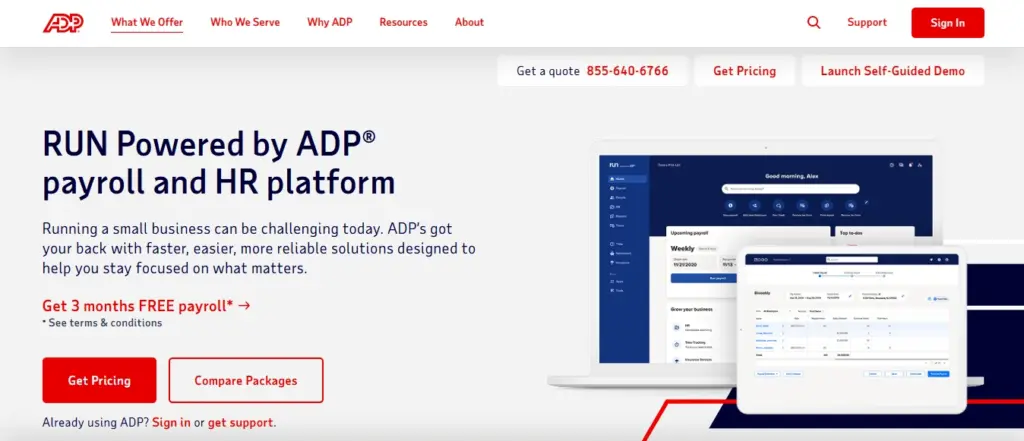
Features:
- Payroll and workforce management.
- Compliance automation for global and local regulations.
- Benefits administration and tax filing.
- Advanced analytics and insights.
Pros:
- Unmatched compliance and security standards
- Ideal for global workforces
Cons:
- High pricing for small and medium businesses
- Limited flexibility in customization
7. PeopleHum
PeopleHum is an easy-to-use human resource management system that focuses on improving engagement and performance. It utilizes AI and automation to make HR smarter.
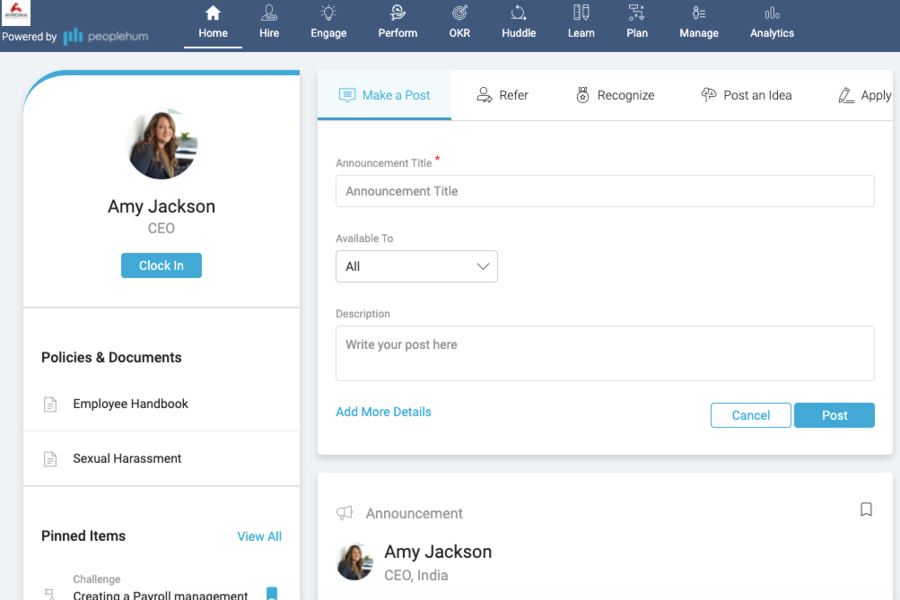
Features:
- AI-based analytics for employee insights.
- Goal setting and performance evaluation tools.
- Surveys and engagement tracking.
- Customizable dashboards and workflows.
Pros:
- Great for engagement and culture-building
- Beautiful UI/UX
- Scalable pricing plans
Cons:
- Some integrations are still limited
- Custom reporting can be improved
8. HROne
HROne is a balance of simplicity and effectiveness in one solution. It’s a modular HRMS software solution that allows you to choose and pay for only what you require.
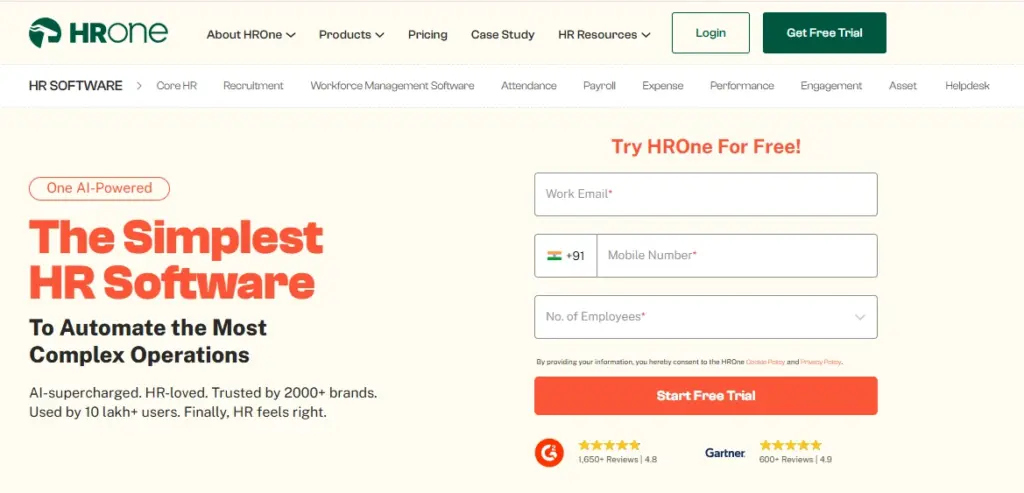
Key Highlights:
- Employee self-service portal.
- Customizable workflows and analytics.
- Payroll and attendance integration.
- In-depth reports for HR insights.
Pros:
- Strong automation tools
- Great value for money
- Employee-friendly interface
Cons:
- Reports could be more detailed
- Limited third-party integrations
9. GreytHR
GreytHR is India’s most reliable payroll and HR software, trusted for its hassle-free usage. With automation at its core, it is the best fit for organizations that have multiple locations to handle.
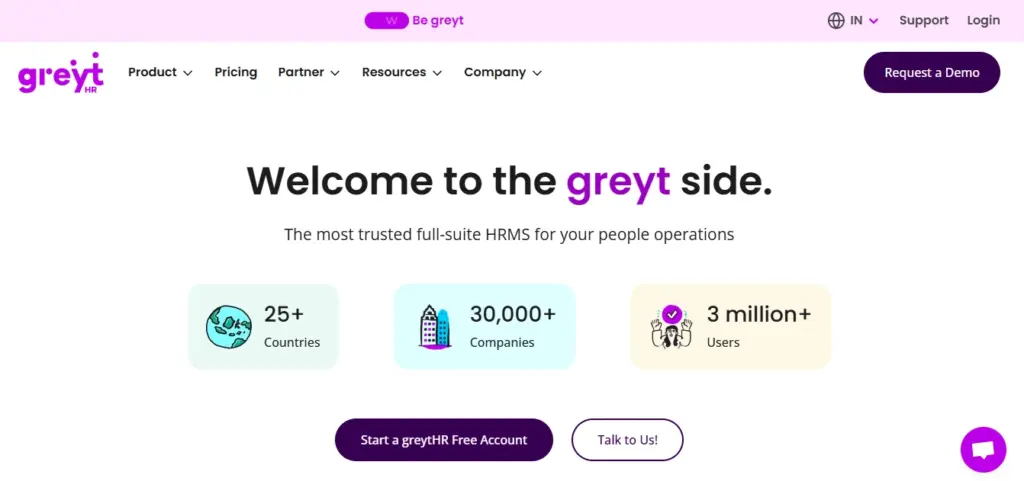
Features:
- Payroll processing with compliance.
- Leave and attendance management.
- Expense claims and reimbursements.
- Dashboards and analytics.
Pros:
- Very affordable pricing
- Simple and fast payroll processing
- Excellent for small businesses
Cons:
- Limited scalability for large organizations
- UI can feel basic compared to newer competitors
10. Keka
Keka is synonymous with contemporary HR. With its employee-centric interface and strong automation capabilities, it’s one of the most popular HR platforms in India.
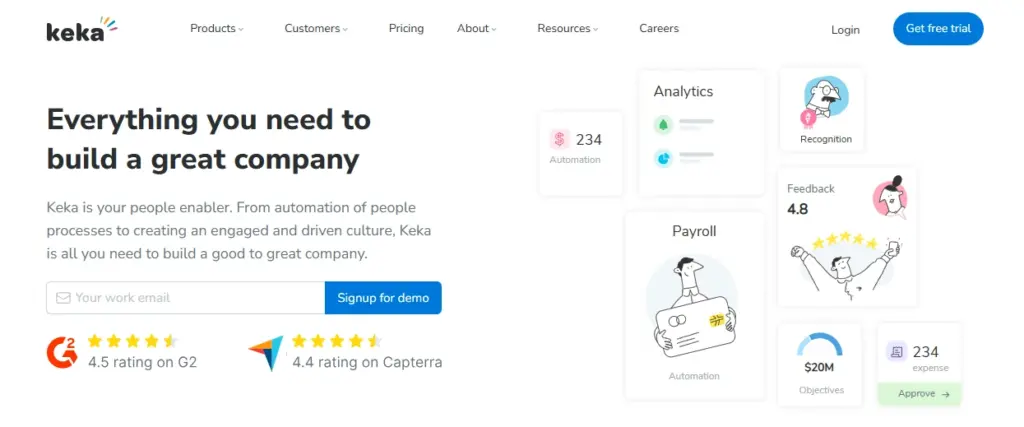
Top Features:
- Automated payroll and performance tracking.
- OKRs, goals, and feedback system.
- Employee engagement and recognition tools.
- Time and attendance tracking.
Pros:
- Excellent employee engagement features
- Beautiful user interface
- Integrates easily with multiple tools
Cons:
- Reporting customization is limited
- Pricing slightly higher for startups
11. ZingHR
ZingHR is a cloud-based HRMS system that blends automation with analytics, empowering HR teams to make data-driven decisions.
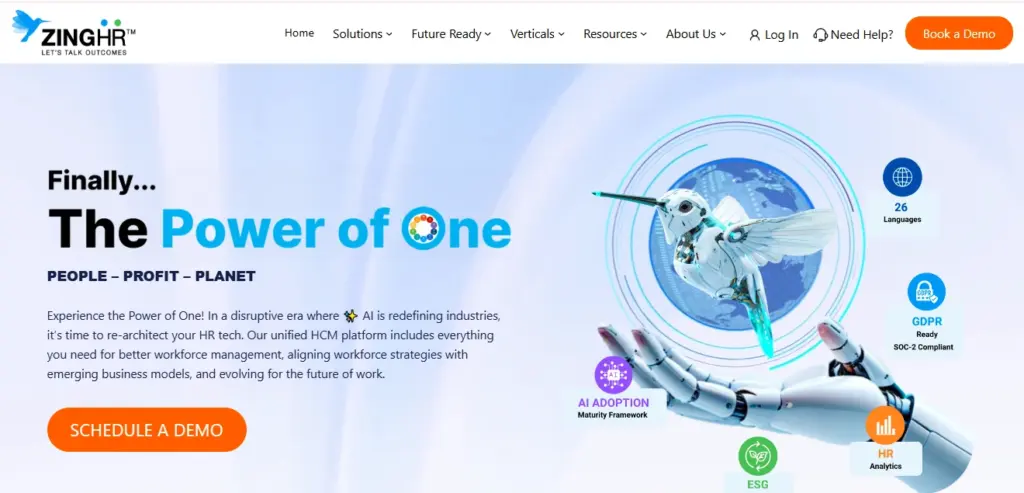
Core Features:
- Cloud-based HR platform.
- AI-enabled insights and workforce analytics.
- Recruitment, payroll, and talent management modules.
- Seamless mobile app integration.
Pros:
- Scalable for all business sizes
- AI-enabled analytics
- Continuous product updates
Cons:
- Slightly steep learning curve
- Occasional performance lags in the web app
Why You Need an HRMS Software
HR departments used to be more administrative in the past due to handling attendance, computing salaries, and paperwork. The HR teams today are supposed to do much more. They have to create company culture, enhance employee engagement, maintain compliance, and drive strategic decisions through data. To handle all of it effectively, organizations need the power of automation and that is precisely what HRMS software provides.
Here’s a closer examination of why every contemporary business requires an HR management system today:
1. Streamlines HR Processes
HR operations using manual methods are cumbersome and error-prone. An HRMS streamlines routine tasks like attendance monitoring, payroll processing, and leave tracking, allowing HR professionals to concentrate on more strategic activities such as talent management and employee engagement. Everything being digital means HR teams get access to data in an instant, making operations smoother and quicker.
2. Reduces Human Errors
Even a small error in payroll or tax deduction can lead to compliance penalties and employee dissatisfaction. An HRMS software ensures accuracy by automatically calculating pay, leaves, and benefits using pre-defined rules. It eliminates the risk of manual mistakes while ensuring 100% compliance with Indian labor laws like PF, ESI, and TDS.
3. Enhances Employee Experience
Employees demand transparency and ease. A Human Resource Management System provides them exactly that through employee self-service portals and mobile applications. Whether they need to look at their leave balance, download a payslip, or submit a request, it can all be done within seconds without seeking HR intervention. This enables employees, enhances engagement, and creates trust.
4. Data-Driven Decision Making
Gone are the days when HR decisions were based on gut feelings. Modern HRMS software comes with powerful analytics dashboards that track employee trends such as attrition rates, performance scores, and engagement levels. HR leaders can use these insights to predict workforce needs, plan retention strategies, and align HR goals with business growth.
5. Ensures Legal Compliance
Staying compliant with Indian labor regulations can be challenging especially with frequent changes in laws and tax structures. The best HRMS software in India automates compliance management by keeping track of statutory deductions, generating reports, and filing necessary documents. This not only minimizes legal risks but also saves the HR team countless hours.
6. Promotes Scalability and Flexibility
As your business expands, HR complexity increases. The advantages of a cloud-based HRMS are that it grows with you. With 20 employees or 2,000 employees, the system adjusts flawlessly by keeping your HR operation nimble without the extra drudgery.
7. Boosts Productivity and Collaboration
HRMS platforms bring all HR functions under one roof ranging from attendance, payroll, performance, recruitment, and communication. This centralization eliminates silos between departments and improves collaboration. Employees, managers, and HR teams stay connected, aligned, and productive.
Non-Negotiable Features in HRMS Software
When looking for the top HRMS software in India, it is easy to become overwhelmed in an ocean of features and hype. But some functionality is absolutely not negotiable, without these, your HRMS won’t provide the efficiency or accuracy your company requires.
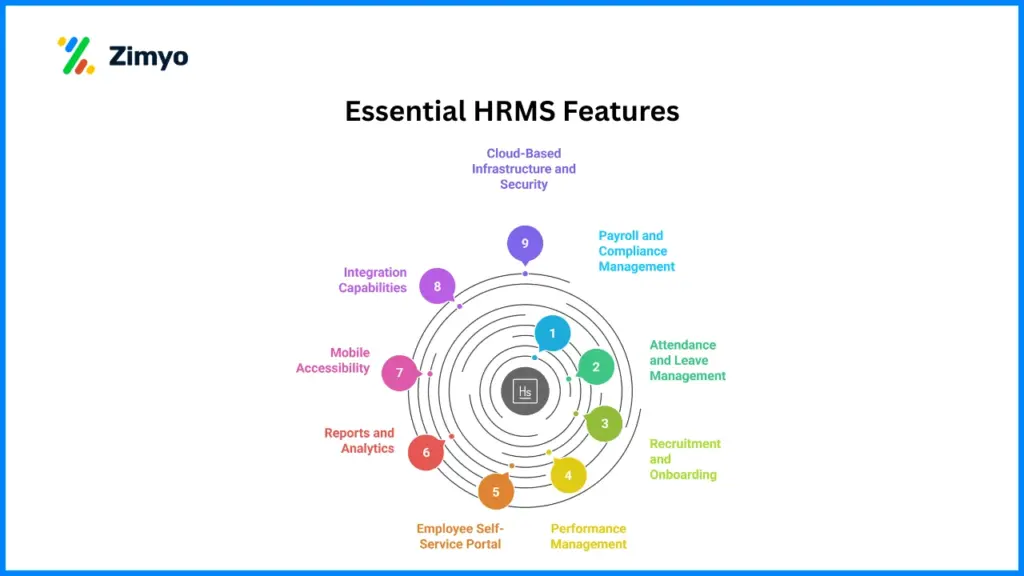
Following are the no-compromise features to find:
1. Payroll and Compliance Management
Payroll is the core of HR functions. Your HRMS should be able to do all the salary calculation to tax deduction electronically. It should provide Indian statutory compliance like PF, ESI, PT, and TDS, and make it easy to generate Form 16, challans, and payslips. Strong payroll module minimizes errors, saves time, and keeps you compliant with the law.
2. Attendance and Leave Management
A top HRMS system should integrate with biometric devices, web check-ins, or GPS tracking to record attendance accurately. It must also support customizable leave policies, automated approvals, and real-time reports. This reduces manual interventions and ensures fair, transparent attendance tracking.
3. Recruitment and Onboarding
Hiring the right talent is crucial, and HRMS software can simplify the entire process. Look for a system that lets you post jobs, track candidates, schedule interviews, and onboard new employees digitally. Automated onboarding workflows ensure new hires feel welcomed and productive from day one.
4. Performance Management
Your HRMS should go beyond data tracking, it should drive growth. With goal-setting tools (OKRs and KRAs), feedback mechanisms, and 360° performance reviews, HRMS helps managers evaluate employee performance objectively and encourage continuous improvement.
5. Employee Self-Service Portal (ESS)
An ESS portal enables employees to view their own HR data such as salary vouchers, leave balances, or attendance records without having to rely on HR. This functionality eliminates redundant inquiries and improves transparency throughout the organization.
6. Reports and Analytics
Data is power. The best HR software provides customizable dashboards and detailed analytics on workforce trends. Whether it’s attendance irregularities, attrition rates, or payroll costs, real-time insights help HR leaders make informed decisions.
7. Mobile Accessibility
During the age of hybrid and remote work, HRMS needs to be anywhere accessible. A mobile-enabled HRMS or stand-alone app enables employees to record attendance, apply for leaves, and view updates on-the-go making HR run non-stop, even after office hours.
8. Integration Capabilities
A great HRMS integrates seamlessly with your accounting software, ERP systems, or communication tools like Slack or Microsoft Teams. This reduces duplicate data entry and streamlines cross-departmental workflows.
9. Cloud-Based Infrastructure and Security
Cloud-based HR management software guarantees up-to-date automatic updates, scalability, and real-time access to information. Besides, strong data encryption and multi-level authentication protect sensitive employee data from data breaches.
Key Criteria in Choosing the Right HRMS Software
With so many HRMS vendors in the market, selecting the right one can feel overwhelming. But choosing the right HR management system is crucial because it impacts everything from daily HR operations to long-term employee engagement.
Here’s how to make an informed choice:
1. Understand Your Organization’s Needs
Before you start investigating software solutions, analyze your HR pain points. Do you have errors in payroll? Is attendance tracking done manually? Or do you lack a single view of employee data? Determining your key pain points will enable you to narrow down HRMS solutions that cater to your exact requirements.
2. Ease of Use and User Experience
A system is only as good as its usability. Select an HRMS with a user-friendly interface that needs minimal training. The optimal HRMS software provides clean dashboards, intuitive navigation, and mobile access, guaranteeing adoption by everyone in your organization.
3. Customization and Flexibility
Each business possesses its own set of policies, processes, and org structures. Make sure your HRMS is adjustable whether that means setting up leave types, payroll frequencies, or approval chains. Software that’s pliable conforms to your org, not the reverse.
4. Integration with Existing Systems
Your HRMS should not be a silo. The best solution should seamlessly integrate with your accounting software, CRM, or attendance systems to form a single, cohesive HR ecosystem. This maintains data consistency and minimizes duplication.
5. Data Security and Compliance
HRMS software deals with extremely sensitive employee information like salary information, personal details, and finance documents. Give preference to suppliers who provide end-to-end encryption, secure storage in the cloud, and support for data protection laws (like GDPR). Data privacy should never be compromised.
6. Scalability
Your company will grow, and with it, so should your HRMS. Choose a scalable solution capable of supporting an increasing workforce, extra modules, or new offices without compromising performance. Cloud-based solutions such as Zimyo are the best in this context.
7. Customer Support and Training
Regardless of how sophisticated your software is, quick support matters. Select an HRMS supplier with a reputation for rapid customer service, personalized onboarding support, and extensive training. This guarantees seamless implementation and downtime is kept at a minimum.
8. Pricing Transparency
HRMS pricing models may differ as some are priced per employee, and others are based on a modular model. Pick one that works within your budget and growth strategy. Always opt for transparent, no-hidden-cost pricing that maximizes ROI.
9. Reviews and Reputation
Before finalizing a vendor, check online reviews, testimonials, and case studies. Platforms like G2 or Capterra can provide authentic insights into user satisfaction and post-sales support. A trusted HRMS provider with proven results is always a safer investment.
Why Choose Zimyo?
Zimyo’s strength lies in its simplicity and scalability. Whether you’re managing a 50-person startup or a 5000-employee enterprise, Zimyo adapts to your needs. Its cloud-based structure ensures smooth performance and secure data storage, while its intuitive dashboard helps HR teams manage everything in a few clicks.
For Indian businesses, Zimyo also provides localized payroll compliance, making it a perfect fit for businesses seeking efficiency and reliability at an affordable price.
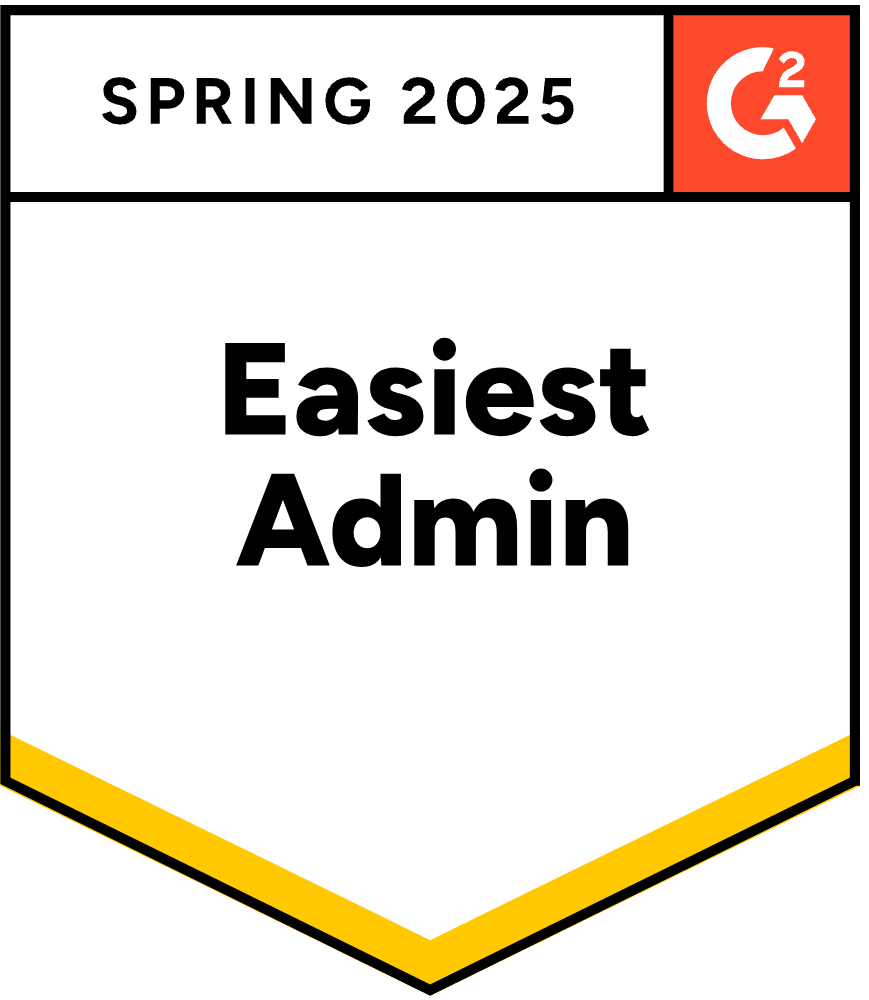
Conclusion
The future of HR is automation and HRMS software is at the center of that change. If you’re handling a small-sized team or a gigantic corporation, the correct HRMS adoption will assist you in decreasing manual labor, staying compliant, and enhancing employee satisfaction.
Amongst numerous other options out there, Zimyo still stands out as one of the top HRMS software in India by providing affordability, customization, and an all-inclusive suite that takes care of all HR functions. It’s not only a tool; it’s a digital partner for your HR department.
Equip your HR team with the right technology today and see your workplace become more efficient, transparent, and human-centered.
FAQs
What is the most popular HR software?
Zimyo is one of the most popular HR software in India, trusted by startups, SMEs, and enterprises. It helps manage everything from payroll and attendance to performance and employee engagement in one unified platform.
Which HR portal is best?
The best HR portal in India is Zimyo. It offers an employee self-service (ESS) portal that allows staff to mark attendance, apply for leaves, view payslips, and access important documents – anytime, anywhere.
What software is HRMS?
HRMS (Human Resource Management System) software is a digital tool that automates HR processes such as payroll, attendance, recruitment, and performance management. A leading example is Zimyo HRMS, which offers end-to-end automation for the entire employee lifecycle.
How do I choose the right HRMS?
To choose the right HRMS, look for ease of use, automation features, customization options, mobile access, and reliable customer support. Zimyo HRMS stands out because it’s simple, scalable, and designed for modern Indian businesses.
Is HRMS an ERP system?
HRMS is a part of an ERP (Enterprise Resource Planning) system, but it focuses specifically on managing people and HR operations. Zimyo HRMS can integrate with ERP tools to streamline HR, payroll, and business workflows seamlessly.

